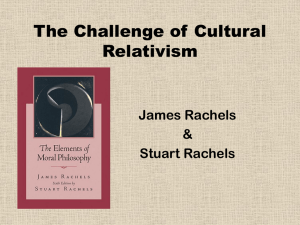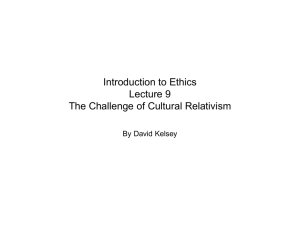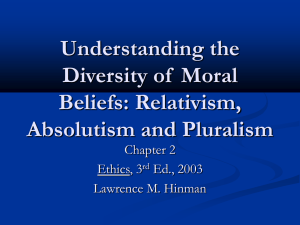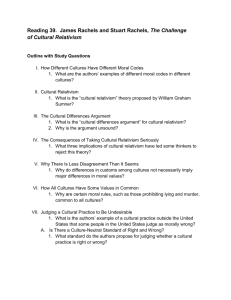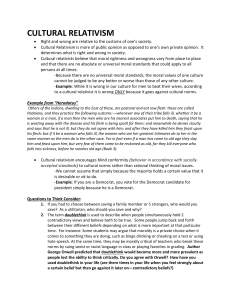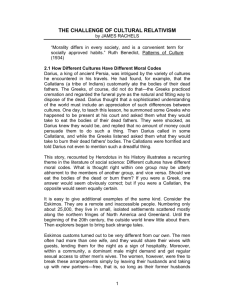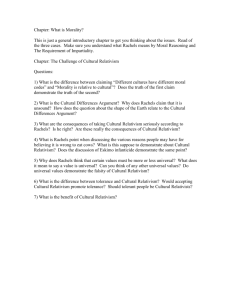challenge of cultural relativism
advertisement
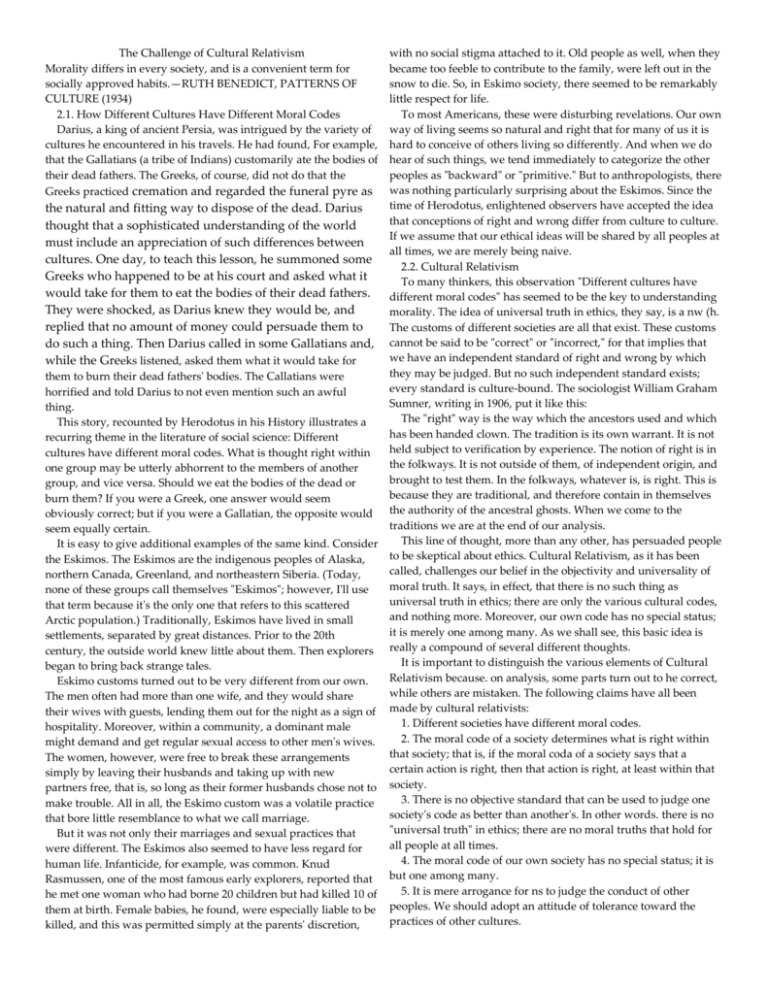
The Challenge of Cultural Relativism Morality differs in every society, and is a convenient term for socially approved habits.—RUTH BENEDICT, PATTERNS OF CULTURE (1934) 2.1. How Different Cultures Have Different Moral Codes Darius, a king of ancient Persia, was intrigued by the variety of cultures he encountered in his travels. He had found, For example, that the Gallatians (a tribe of Indians) customarily ate the bodies of their dead fathers. The Greeks, of course, did not do that the Greeks practiced cremation and regarded the funeral pyre as the natural and fitting way to dispose of the dead. Darius thought that a sophisticated understanding of the world must include an appreciation of such differences between cultures. One day, to teach this lesson, he summoned some Greeks who happened to be at his court and asked what it would take for them to eat the bodies of their dead fathers. They were shocked, as Darius knew they would be, and replied that no amount of money could persuade them to do such a thing. Then Darius called in some Gallatians and, while the Greeks listened, asked them what it would take for them to burn their dead fathers' bodies. The Callatians were horrified and told Darius to not even mention such an awful thing. This story, recounted by Herodotus in his History illustrates a recurring theme in the literature of social science: Different cultures have different moral codes. What is thought right within one group may be utterly abhorrent to the members of another group, and vice versa. Should we eat the bodies of the dead or burn them? If you were a Greek, one answer would seem obviously correct; but if you were a Gallatian, the opposite would seem equally certain. It is easy to give additional examples of the same kind. Consider the Eskimos. The Eskimos are the indigenous peoples of Alaska, northern Canada, Greenland, and northeastern Siberia. (Today, none of these groups call themselves "Eskimos"; however, I'll use that term because it's the only one that refers to this scattered Arctic population.) Traditionally, Eskimos have lived in small settlements, separated by great distances. Prior to the 20th century, the outside world knew little about them. Then explorers began to bring back strange tales. Eskimo customs turned out to be very different from our own. The men often had more than one wife, and they would share their wives with guests, lending them out for the night as a sign of hospitality. Moreover, within a community, a dominant male might demand and get regular sexual access to other men's wives. The women, however, were free to break these arrangements simply by leaving their husbands and taking up with new partners free, that is, so long as their former husbands chose not to make trouble. All in all, the Eskimo custom was a volatile practice that bore little resemblance to what we call marriage. But it was not only their marriages and sexual practices that were different. The Eskimos also seemed to have less regard for human life. Infanticide, for example, was common. Knud Rasmussen, one of the most famous early explorers, reported that he met one woman who had borne 20 children but had killed 10 of them at birth. Female babies, he found, were especially liable to be killed, and this was permitted simply at the parents' discretion, with no social stigma attached to it. Old people as well, when they became too feeble to contribute to the family, were left out in the snow to die. So, in Eskimo society, there seemed to be remarkably little respect for life. To most Americans, these were disturbing revelations. Our own way of living seems so natural and right that for many of us it is hard to conceive of others living so differently. And when we do hear of such things, we tend immediately to categorize the other peoples as "backward" or "primitive." But to anthropologists, there was nothing particularly surprising about the Eskimos. Since the time of Herodotus, enlightened observers have accepted the idea that conceptions of right and wrong differ from culture to culture. If we assume that our ethical ideas will be shared by all peoples at all times, we are merely being naive. 2.2. Cultural Relativism To many thinkers, this observation "Different cultures have different moral codes" has seemed to be the key to understanding morality. The idea of universal truth in ethics, they say, is a nw (h. The customs of different societies are all that exist. These customs cannot be said to be "correct" or "incorrect," for that implies that we have an independent standard of right and wrong by which they may be judged. But no such independent standard exists; every standard is culture-bound. The sociologist William Graham Sumner, writing in 1906, put it like this: The "right" way is the way which the ancestors used and which has been handed clown. The tradition is its own warrant. It is not held subject to verification by experience. The notion of right is in the folkways. It is not outside of them, of independent origin, and brought to test them. In the folkways, whatever is, is right. This is because they are traditional, and therefore contain in themselves the authority of the ancestral ghosts. When we come to the traditions we are at the end of our analysis. This line of thought, more than any other, has persuaded people to be skeptical about ethics. Cultural Relativism, as it has been called, challenges our belief in the objectivity and universality of moral truth. It says, in effect, that there is no such thing as universal truth in ethics; there are only the various cultural codes, and nothing more. Moreover, our own code has no special status; it is merely one among many. As we shall see, this basic idea is really a compound of several different thoughts. It is important to distinguish the various elements of Cultural Relativism because. on analysis, some parts turn out to he correct, while others are mistaken. The following claims have all been made by cultural relativists: 1. Different societies have different moral codes. 2. The moral code of a society determines what is right within that society; that is, if the moral coda of a society says that a certain action is right, then that action is right, at least within that society. 3. There is no objective standard that can be used to judge one society's code as better than another's. In other words. there is no "universal truth" in ethics; there are no moral truths that hold for all people at all times. 4. The moral code of our own society has no special status; it is but one among many. 5. It is mere arrogance for ns to judge the conduct of other peoples. We should adopt an attitude of tolerance toward the practices of other cultures. These five propositions may seem to go together, but they are independent of one another, in the sense that some of them might be false even if others are true. Indeed, two of them appear to be inconsistent with each other, The second proposition says that right and wrong are determined b the norms of a society; the fifth proposition says that we should always be tolerant of other cultures. But what if the norms of a society favor intolerance? For example, when the Nazi army marched into Poland on September 1, 1939, thus beginning World War II, this was an intolerant action of the first of der. But what if it was in line with Nazi ideals? A cultural relativist, it seems, cannot criticize the Nazis for being intolerant, if all they're doing is following their own moral code. Given that cultural relativists take pride in their tolerance, it would be ironic if their theory actually supported people in intolerant cultures being intolerant of other societies. However, it need not have that implication. Properly understood, Cultural Relativism holds that the norms of a culture reign supreme within the bounds of the culture itself: Thus, once the German soldiers entered Poland, they became bound by the norms of Polish society norms that obviously excluded the mass slaughter of innocent Poles. "When in Rome," the old saying goes, "do as the Romans do." Cultural relativists agree. 2.3. The Cultural Differences Argument Cultural Relativism is a theory about the nature of morality. At first blush, it seems quite plausible. However, like all such theories, it may be subjected to rational analysis; and when we analyze Cultural Relativism, we find that it is not as plausible as it initially appears to be. The first thing to notice is that at the heart of Cultural Relativism is a certain form of argument. Cultural relativists argue from facts about the differences between cultural outlooks to a conclusion about the status of morality. Thus, we are invited to accept this reasoning: (I) The Greeks believed it was wrong to eat the dead, whereas the Callatians believed it was right to eat the dead. (2} Therefore, eating the dead is neither objectively right nor objectively wrong. It is merely a matter of opinion that varies from culture to culture. Or, alternatively: (1) The Eskimos see nothing wrong with infanticide, whereas Americans believe infanticide is immoral. (2) Therefore, infanticide is neither objectively right nor objectively wrong. It is merely a matter of opinion, which varies from culture to culture. Clearly, these arguments are variations of one fundamental idea. They are both special cases of a more general argument, which says: (1) Different cultures have different moral codes. (2) Therefore. there is no objective "truth" morality. Right and wrong are only matters of opinion. and opinions vary front culture to culture. We may call this the Cultural Differences Argument. To many people, it is persuasive. But from a logical point of view, is it sound? It is not sound. The problem is that r he conclusion does not follow from the premise that is, even if the premise is true, the conclusion still might be false. The premise concerns what people however some societies, people believe one thing; in other societies, people believe something else. The conclusion, however, concerns what really is the case. The trouble is that this sort of conclusion does not follow logically from this sort of premise. Consider again the example of the Greeks and Callatians. The Greeks believed it was wrong to eat the dead; the Callatians believed it was right. Does it follow, from the mere fact that they disagreed, that there is no objective truth in the matter? No, it does not follow; it could be that the practice was objectively right (or wrong) and that one of them was simply mistaken. To make the point clearer, consider a different matter. In some societies, people believe the earth is flat. In other societies, such as our own, people believe the earth is spherical. Does it follow, from the mere fact that people disagree, that there is no "objective truth" in geography? Of course not—we would never draw such a conclusion because we realize that, in their beliefs about the world, the members of some societies might simply be wrong. There is no reason to think that if the world is round everyone must know it. Similarly, there is no reason to think that if there is moral truth everyone must know it. The fundamental mistake in the Cultural Differences Argument is that it attempts to derive a substantive conclusion about a subject from the mere fact that people disagree about it. This is a simple point of' logic, and it is important not to misunderstand it. We are not saying that the conclusion of the alternative is false, That is still an open question. The logical point is merely that the conclusion does not follow from the premise. This is important, because in order to determine whether the conclusion is true, we need arguments in its support. Cultural Relativism proposes this argument, but it is fallacious. So it proves nothing. 2.4. The Consequences of Taking Cultural Relativism Seriously Even if the Cultural Differences Argument is unsound, Cultural Relativism might still he true. What would it be like if it were true? In the passage quoted above, William Graham Sumner states the essence of Cultural Relativism. He says that there is no measure of right and wrong other than the standards of one's society: "The lotion of right is in the folkways. It is not outside of them, of independent origin, and brought to test them. In the folkways, whatever is, is right." Suppose we took this seriously. What would be some of the consequences? 1. We could no longer say that the customs of other societies are morally inferior to our own. This, of course, is one of the main points stressed by Cultural Relativism. We would have to stop condemning other societies merely because they are "different." So long as we concentrate on certain examples, such as the funerary practices of the Greeks and Callatians, this may seem to be a sophisticated, enlightened attitude. However, we would also be barred from criticizing other, less benign practices. For example, the Chinese government has a long tradition of repressing political dissent within its own borders. At any given time, thousands of political prisoners in China are doing hard labor, and in the Tiananmen Square episode of 1989, Chinese troops slaughtered hundreds, if not thousands, of peaceful protesters. Cultural Relativism would preclude us from saying that the Chinese government's policies of oppression are wrong. (We could not even say that a society that respects free speech is better than Chinese society, for that would imply a universal standard of comparison.) The failure to condemn these practices does not seem enlightened; on the contrary, political oppression seems wrong wherever it occurs. Nevertheless, if we accept Cultural Relativism, we have to regard such social practices as immune from criticism. 2. We could decide whether our actions are right or wrong just by, consulting the standards of our society. Cultural Relativism suggests a simple test for determining what is right and what is wrong: All we need to do is ask whether the action is in line with the code of the society iii question. Suppose a resident of India wonders whether her country's caste system a system of rigid social hierarchy is morally correct. All she has to do is ask whether this system conforms to her society's moral code. If it does, there is nothing to worry about, at least from a moral point of view. This implication of Cultural Relativism is disturbing because few of us think that our society's rode is perfect. We can think of all sorts of ways in which it might be improved. Yet Cultural Relativism not only forbids us from criticizing the codes of other societies; it also stops us from criticizing our own. After all, if right and wrong are relative to culture, this must be true for our own culotte hest as much as for other cultures. 3. The idea of moral progress is called into doubt. We think that at least some social changes are for the better. Throughout most of Western history, the place of women in society was narrowly circumscribed. Wooten could not own property; they could not vote or hold political office; and they were under the almost absolute control of their husbands. Recently, much of this has changed, and most people think of it as progress. But if Cultural Relativism is correct, can we legitimately view this as progress? Progress means replacing a way of doing things with a better way. But by what standard do we judge the new ways as better? If the old ways were in accordance with the social standards of their time, then Cultural Relativism would say it is a mistake to judge them by the standards of another era. Eighteenthcentury society was a different society from the one we have now. To say that we have made progress implies a judgment that present-day society is better— just the sort of transcultural judgment that, according to Cultural Relativism, is unacceptable. Our ideas about social reform will also have to be reconsidered. Reformers such as Martin Luther King, Jr., have sought to change their societies fin the better. Within the constraints imposed by Cultural Relativism, there is only one way this might be done. If a society is not living up to its own ideals, the reformer may be regarded as acting for the best in promoting those ideals. After all, those ideals are the standard by which we judge his or her proposals. But no one may challenge the ideals themselves, for they are by definition correct. According to Cultural Relativism, then, the idea of social reform makes sense only in this limited way. These three consequences of Cultural Relativism have led many thinkers to reject it as implausible on its face. It does make sense, they say, to condemn some practices, such as slavery and antiSemitism, wherever they occur. It makes sense to think that our own society has made some moral progress, while admitting that it is still imperfect and in need of reform. Because Cultural Relativism implies that these judgments make no sense, the argument goes, it cannot be right. 2.5. Why There Is Less Disagreement Than It Seems The original impetus for Cultural Relativism comes from the observation that cultures differ dramatically in their views of right and wrong. But how much do they actually differ? It is true that there are differences. However, it is easy to overestimate the extent of those differences. Often, when we examine what seems to be a dramatic difference, we find that the cultures do not differ nearly as much as it appears. Consider a culture in which people believe it is wrong to eat cows. This may even be a poor culture, in which there is not enough food; still, the cows are not to be touched. Such a society would appear to have values very different from our own. But does it? We have not yet asked why these people will not eat cows. Suppose it is because they believe that after death the souls of humans inhabit the bodies of animals, especially cows, so that a cow may, be someone's grandmother. Shall we say that then values are different from ours? No: the difference lies elsewhere. The difference is in our belief systems, not in our values. We agree that we shouldn't eat Grandma; we simply disagree about whether Grandma could be a cow. The point is that many factors work together to produce the customs of a society. The society's values are only one of them. Other matters, such as the religious and factual beliefs held by its members, and the physical circumstances in which they. live, are also important. We cannot conclude, then, merely because customs differ, that there is disagreement about values. The difference in customs may be attributable to some other aspect of social life. Thus, there may be less disagreement about values than there appears to be. Consider again the Eskimos, who killed perfectly healthy infants, especially girls. We do not approve of such things; in our society, a parent who kills a baby will be locked up. Thus, there appears to be a great difference in the values of our two cultures. But suppose we ask why the Eskimos did I his. The explanation is not that they had no affection for their children or lacked respect for human life. An Eskimo family would always protect its babies if conditions permitted. But the Eskimos lived in a harsh environment, where food was in short supply. A fundamental postulate of Eskimo thought was this: "Life is hard, and the margin of safety small." A family may want to nourish its babies but be unable to do so. As in many traditional societies, Eskimo mothers would nurse their infants over a much longer period than mothers in our culture—for four years, and perhaps even longer. So, even in the best of times, there were limits to the number of infants one mother could sustain. Moreover, the Eskimos were nomadic; unable to farm in the harsh northern climate, they had to move about in search of food. Infants had to be carried, and a mother could care only one baby in her parka as she traveled and went about her outdoor work. Infant girls were more readily disposed of for two reasons. First, in Eskimo society; the males were the primary food providers they were the hunters and it is obviously important to maintain a sufficient number of food providers. But there was an important second reason as well. Because the hunters suffered a high casualty rate, the adult men who died prematurely far outnumbered the women who died early. If male and female infants had survived in equal numbers, the female adult population would have greatly outnumbered the male adult population. Examining the available statistics, one writer concluded that were it not for female infanticide there would be approximately one and a half times as many females in the average Eskimo local group as there are food producing males." So among the Eskimos, infanticide did not signal a fundamentally different attitude toward children. Instead, it arose from the recognition that drastic measures are sometimes needed to ensure the family's survival. Even then, however, killing the baby was not the first option considered. Adoption was common; childless couples were especially happy to take a mole fertile couple's "surplus." Killing was the last resort. I emphasize this in order to show that the raw data of anthropologists can be misleading; it can make the differences in values between cultures appear greater than they are. The Eskimos' values were not all that different from our own. It is only that life forced choices upon them that we do not have to make. 2.6. How All Cultures Have Some Values in Common It should not be surprising that, despite appearances, the Eskimos were protective of their children. How could it be otherwise? How could a group survive that did not value its young? It is easy to see that, in fact, all cultural groups must protect their infants. Babies are helpless and cannot survive if they are not given extensive care for a period of years. Therefore, if a group did not care for its young, the young would not survive, and the older members of the group would not be replaced. After a while, the group would die out. This means that any cultural group that continues to exist must care for its young. Infants who are not cared for must be the exception rather than the rule. Similar reasoning shows that other values must be more or less universal. Imagine what it would be like for a society to place no value on truth telling. When one person spoke to another, there would he no presumption that she was telling the truth, for she could just as easily be lying. Within that society, there would be no reason to pay attention to what anyone says. (1 ask you what time it is, and you say, "Four o'clock." But there is no presumption that you are speaking truly; you could just as easily have said midnight. So I have no reason to pay attention to your answer. In fact, there was no point asking you in the first place.) Communication would be extremely difficult, if not impossible. And because complex societies cannot exist without communication among their members, society would become impossible. It follows that in any complex society there must be a presumption in favor of truthfulness. There may, of course, be exceptions to this rule; that is, there may be situations in which it is thought to be permissible to lie. Nevertheless, these will be exceptions to a rule that is in force in the society. Here is one more example of the same type. Could a society exist in which there was no prohibition on murder? What would this be like? Suppose people were free to kill one another at will, and no one thought there was anything wrong with it. In such a "society," no one could feel safe. Everyone would have to be constantly on guard, and to survive they would have to avoid other people as much as possible. This would inevitably result in individuals trying to become as self-sufficient as possible after all, associating with others would be dangerous. Society on any large scale would collapse. Of course, people might band together in smaller groups with others whom they could trust not to harm them. But notice what this means: They would be forming smaller societies that did acknowledge a rule against murder. The prohibition of murder, 'hen, is a necessary feature of all societies. There is a general theoretical point here, namely, that there are some moral rules that all societies must have in common, because those rules are necessary for society to exist. The rules against lying and murder are two examples. And, in fact, we do find these rules in force in all viable cultures. Cultures may differ in what they regard as legitimate exceptions to the rules, but this disagreement exists against a broad background of agreement. Therefore, it is a mistake to overestimate the amount of difference between cultures. Not every moral rule can vary from society to society. 2.7. Judging a Cultural Practice to Be Undesirable In 1996, a 17-year-old named Fauziya Kassindja arrived at Newark International Airport in New Jersey and asked for asylum. She had fled her native country of Togo, a small West African nation, to escape what people there call "excision." Excision is a permanently disfiguring procedure that is sometimes called "female circumcision," although it bears little resemblance to the Jewish practice. More commonly, at least in Western media, it is referred to as "female genital mutilation.” According to the World Health Organization, the practice is widespread in 26 African nations, and 2 million girls each year are painfully excised. In some instances, excision is part of an elaborate tribal ritual, performed in small villages, and girls look forward to it because it signals their acceptance into the adult world. In other instances, the practice is carried out in cities on young women who desperately resist. Fauziya Kassindja was the youngest of five daughters in a devoutly Muslim family. Her father, who owned a successful trucking business, was opposed to excision, and he was able to defy the tradition because of his wealth. His first four daughters were married without being mutilated. But when Fauziya was 16, he suddenly died. She then came under the authority of her aunt, who arranged a marriage for her and prepared to have her excised. Fauziya was terrified, and her mother and oldest sister helped her escape. In America, Fauziya was imprisoned for nearly 18 months while the authorities decided what to do with her. During this time, she was subjected to humiliating strip searches, denied medical treatment for her asthma, and generally treated like a dangerous criminal. Finally, she was granted asylum, but not before she became the center of a controversy about how we should regard the cultural practices of other peoples. A series of articles in 7 he New York Times encouraged the idea that excision is a barbaric practice that should be condemned. Other observers were reluctant to be so judgmental. Live and let live, they said; after all, our culture probably seems just as strange to them. Suppose we are inclined to say that excision is bad. Would we merely be imposing the standards of our own culture? if Cultural Relativism is correct, that is all we can do, for there is no culture neutral moral standard to which we may appeal. But is that true? Is There a Culture Neutral Standard of Right and Wrong? There is much that can be said against excision. Excision is painful and results in the permanent loss of sexual pleasure. Its shortterm effects can include hemorrhage, tetanus, and septicemia. Sometimes the woman dies. Long-term effects can include chronic infection, scars that hinder walking, and continuing pain. Why, then, has it become a widespread social practice? It is not easy to say. The practice has no obvious social benefits. Unlike Eskimo infanticide, it is not necessary for the group's survival. Nor is it a matter of religion. Excision is practiced by groups from various religions, including Islam and Christianity, neither of which commends it. Nevertheless, a number of reasons are given in its defense. Women who are incapable of sexual pleasure are less likely to be promiscuous; thus, there will be fewer unwanted pregnancies in unmarried women. Moreover, wives for whom sex is only a duty are less likely to he unfaithful to their husbands; and because they are not thinking about sex, they will be more attentive to the needs of their husbands and children. Husbands, for their part, are said to enjoy sex more with wives who have been excised. (The women's own lack of enjoyment is said to be unimportant.) Men will not want uncircumcised women, as they are unclean and immature. Above all, excision has been done since antiquity, and we may not change the ancient ways. It would be easy, and perhaps a bit arrogant, to ridicule these arguments. But notice an important feature of this whole line of reasoning: It attempts to justify excision by showing that excision is beneficial—men, women, and their families are said to be better off' when women are excised. Thus, we might approach this reasoning, and excision itself, by asking whether this is true: Is excision, on the whole, helpful or harmful? In fact, this is a standard that might reasonably be used in thinking about any social practice: Does the practice promote or harm the welfare of the people whose lives are affected In ?I? And, as a corollary, we may ask if there is an alternative set of social arrangements that would do a better job of promoting their welfare. If there is, we may conclude that the existing practice is deficient. But this looks like just the sort of independent moral standard that Cultural Relativism says cannot exist. It is a single standard that may be brought to bear in judging the practices of any culture, at any time, including our own. Of course, people will not usually see this principle as being "brought in from the outside" to judge them, because all viable cultures value human happiness. Why, Despite All This, Thoughtful People May Be Reluctant to Criticize Other Cultures. Although they are personally horrified by excision, many thoughtful people are reluctant to say it is wrong, for at least three reasons. First, there is an understandable nervousness about interfering in the social customs of other peoples. Europeans and their cultural descendants in America have a shabby history of destroying native cultures in the name of Christianity and enlightenment. Recoiling 1rorn his shameful record, some people refuse to criticize other cultures, especially cultures that resemble those that have been wronged in the past. There is a difference, however, between (a) judging a cultural practice to be deficient and (b) thinking that we should announce that fact, conduct a campaign, apply diplomatic pressure, and send in the troops. The first is just a matter of a trying to see the world clearly, from a moral point of view. The second is something else entirely. Sometimes it may be right to "do something about it." but often it will not be. Second, people may feel, rightly enough. that they should he tolerant of other cultures. Tolerance is, no doubt, a virtue a tolerant person is willing to live in peaceful cooperation with those who see things differently. But there is nothing in the nature of tolerance that requires us to say that all beliefs. all religions. and all social practices are equally admirable. On the contrary, if we did not think that some were better than others, there would be nothing for us to tolerate. Finally, people may be reluctant to judge because they do not want to express contempt for the society being criticized. Thus, when we hear it suggested that some element of our social code is not really the best, and we find ourselves instinctively resisting the suggestion, we might stop and remember this. Then we will be more open to discovering the truth, whatever it might he. We can understand the appeal of Cultural Relativism, then, even though the theory has serious short-comings. It is an attractive theory because it is based on a genuine insight: that many of the practices and attic odes we think so natural are really only cultural products. Moreover, keeping this thought firmly in view is important 'five want to avoid arrogance and keep an open mind. These are important points not to be taken lightly, but we can accept them without accepting the whole theory. 2.9. Back to the Five Claims Let us now return to the five tenets of Cultural Relativism that were listed earlier. How did they fare in our discussion? 1. Different societies have different moral codes. This is certainly true, although there are some values that all cultures share, such as the value of truth telling, the importance of caring for the young, and the prohibition on murder. Also, when customs differ, the underlying reason will often have more to do with the factual beliefs of the cultures than with their values. 2. The moral code of a society determines what is right within that society; that is, if the moral code of a society says that a certain action is right, then that action is right, at least within that society. Here we must bear in mind the difference between what a society believes about morals and what is really true. The moral code of a society has a lot to do with what people in that society believe to be right. However, that code, and those people, can be in error. Earlier, we considered the example of excisiona barbaric practice endorsed by many societies. Consider two more examples. In 2005, a young woman from Australia was convicted of trying to smuggle nine pounds of marijuana into Indonesia. For that crime, she was sentenced to 20 years in prison. Under Indonesian law, she might have received death. In 2002, an unwed mother in Nigeria was sentenced to he stoned to death for having had sex out of wedlock. It is unclear whether Nigerian values, on the whole, approve of this verdict, since it was later overturned. But when the verdict was read, everyone in the courtroom shouted their approval. Cultural Relativism holds, in effect, that societies area morally infallible in other words, that the morals of a culture can never be wrong. But when we see that societies can and do endorse grave injustices, we see that societies, like their members, can be in need of moral improvement. 3. There is no objective standard that can be used to_ judge one society's code as better than another's. In other words, there is no "universal truth" in ethics; there are no moral truths that hold for all people at all times. It is difficult to think of ethical principles that hold for all people at all times. However, if we are to criticize the practice of slavery, or stoning, or genital mutilation, and if we do not retreat from the idea that such practices are really and truly wrong, we must appeal to principles that are not tethered to one society's peculiar outlook. Earlier I suggested one such principle: that it always matters whether a practice promotes or hinders the welfare of the people affected by it. 4. The moral code of our own society has no special status; it is but one among many. It is true that the moral code of our society has no special status. After all, our society has no heavenly halo around its borders; our values do not have any special standing just because we happen to believe them. However, to say that the moral code of one's own society "is merely one among many" seems to deny the possibility that one moral code might be better or worse than some other's. Whether the moral code of one's own society "is merely one among many" is, in fact, an open question. That code might be one of the best; it might be one of the worst. 5. It is mere arrogance for us to judge the conduct of other peoples. We should adopt an attitude of tolerance toward the practices of other cultures. There is much truth in this, but the point is me) stated. We are often arrogant when we criticize other cultures, and tolerance is generally a good thing. However, we shouldn't be tolerant of everything. Human societies have done terrible things, and it is a mark of progress when we can say that those things are in the past.
